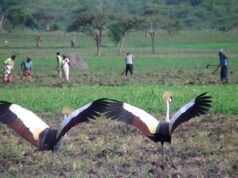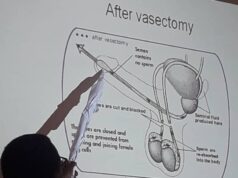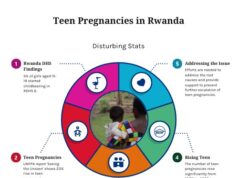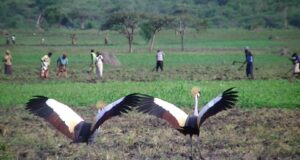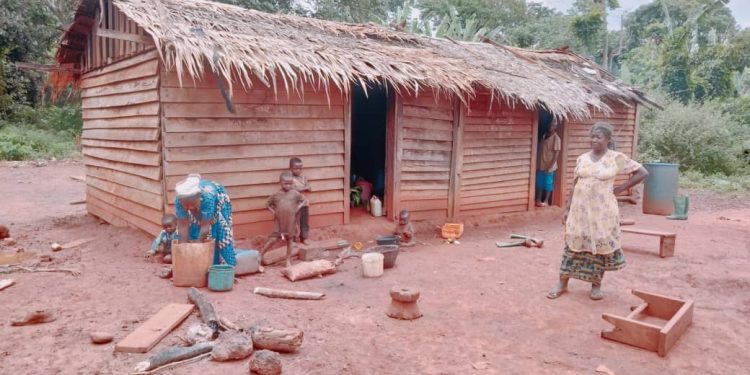
By Louvier Kindo Tombe, on special assignment in Yokadouma, East Region of Cameroon
The Baka Community is facing extinction. Their main source of livelihood (the forest), is being exploited to their detriment. Human activities in and around the forest are affecting their existence. It is becoming more and more difficult for them to feed, commune with ancestors, and preserve their culture and traditions. Thier story is that of a people who have decided to fight and die for their rights to be respected.
It was a frailed looking chief of the Baka Community in Elandjo’o, about 800 km away from Yaounde in the East region of Cameroon who received us in his village on Friday October 7, 2022. Children, men and women had gathered around chief Lessa Blaise. The entire community had mobilized to tell the story of their daily challenges.
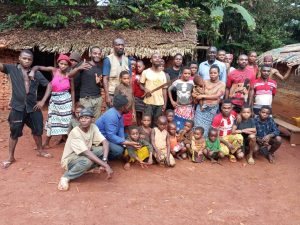
“Have the Baka people become animals overnight?,” Chief Lessa Blaise questioned.
The young and dynamic chief, was wondering how people could be heartless to treat them like animals.
The Baka in the Boumba and Ngoko Division of the East region are facing a wide range of challenges, the most prominent of it being limited access to forest areas which to them is their main source of livelihood.
“We feed, treat ourselves and take care of our other needs thanks to Non Timber Forest Products (NTFP) which we harvest inside the forest,” Blaise said.
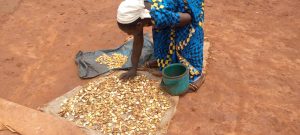
“Denying us access into the forest is not different from killing us silently,” he continued.
During our stay in Elandjo’o, we were made to understand that the Baka people are constantly at loggerheads with eco guards and other forest officials. They are being intimidated on a daily basis to stay away from the forest.
“They always break into our houses, destroy our food items, torture us physically and threaten us with guns for no good reason,” a Baka Indigene recounts, adding that “one day a forest guard even slapped our chief in the presence of his wife, we were helpless”.
Just like in Elandjo’o, the Baka and Bantu people living in forest zones in Cameroon are actually being prevented from accessing the forest.
Denying them access into the forest is also killing thier rich culture and tradition.
“Look at us, we can’t climb trees like our parents, we don’t even know most of the traditional rites our parents used to perform in the forest, all because we don’t have access,” Chief Lesaa said. “When I look at our children I weep for their future,” he continued.
“It is important to facilitate access into the forest for them,” Madam Akongongal Miranda Mikam, President of AAFEBEN said.
AAFEBEN is a Non Governmental Organization, specialized in supporting self dependence of women in the Boumba and Ngoko Division, East region of Cameroon.
The NGO recently organized a workshop in Yokadouma, headquarters of the Division. Focus was to lobby the powers that be to facilitate access to NTFP in the forest for the indigenous population in the region.
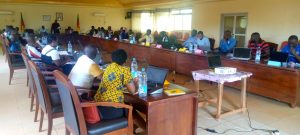
At the end of the workshop, the participants agreed that on the following;
– That it is important to assist the local communities have access to NTFPs,
– That it is necessary to train them on the importance of each of the Non Timber Forest Products,
– That the council should embrace the NTPF sector and make it a tool for communal development,
– That it is important to revise the different texts regulating the NTFP domain, and encourage the signing of collaboration documents (MoUs) with local communities around forest areas.
Present at the Yokadouma workshop was the Boumba and Ngoko Divisional Delegate for Forestry and Wildlife, André Bekolo, who saluted the initiative and enjoined the promoters to multiply efforts in seeking the wellbeing and respect of the rights of the indigenous population. The Mayor of Yokadouma was equally present.
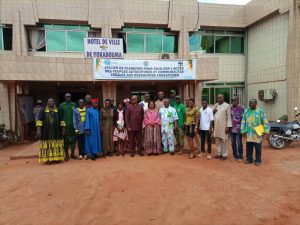
According to some eco guards present at the workshop, some periods are very dangerous in the forests, especially hunting seasons. Stray bullets risk targeting those harvesting NTFPs in the forest. That is why they locals are sometimes denied access into the forest.
To the communities, the hunting periods often coincide with seasons of high harvest, making it difficult for them to make good yields.
The workshop, it should be noted was organized in collaboration with Green Development Advocate (GDA), an NGO that advocates for the respect of the rights of local communities, among other activities.
According to a study carried out by GDA, the government of Cameroon has made some advancements in the laws and texts governing the NTFP sector, but some of the documents are limited and conflicting.
If the different products have been categorized, it is still an issue for the people to operate freely.
Most of the documents needed to operate in the sector are obtained in Yaounde. The duration of the exploitation permit (1year) is not comfortable enough given that the products are seasonal. The local communities are tasked to pay for regeneration tax whereas they do not destroy the sources of the products.
The legal analysis of the Judicial framework in the NTFP sector was presented during the workshop by Ekane Nkwelle, Project Manager at GDA.
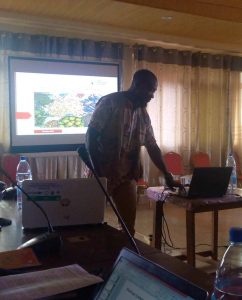
The bigger issue is with inhabitants in local communities who do not even have the means to operate formally.
Most of the products collected in the forest are ‘Njangsa’, Okok, ‘Bush Mangoe’, Colanuts, …etc, classified by the government under category three (3) of NTFPs.
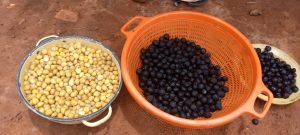
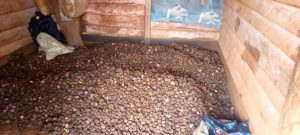
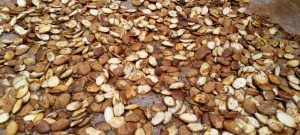
“At times we cover a distance of over 4 kilometers just to harvest these products inside the forest,” an indigene of Gribe, a Bantu village hosting Baka people within the Yokadouma council area told News Upfront.
Access to these products is however not their only obstacle.
“We need buyers for our products,” another woman in Gribe said.
Marketing NTFPs is even more challenging than harvesting.
“Most people who come to buy from us are duping us, we don’t have a choice, we have to sell to them at their price in order to survive,” says Chief Lessa Blaise of Elandjo’o village.
“Some customers usually pre-finance our collection process, and when the products are ready, we are forced to sell but to them first, often at cheaper rates,” Chief Lessa further explained.
There are no standard or harmonized prices for the products. The prices depend solely on seasons and market trends.
The women in Gribe have mobilized themselves in an association known as “Union Fait la Force“. Their mission is to collectively overcome the challenges they face, especially dealing with customers.
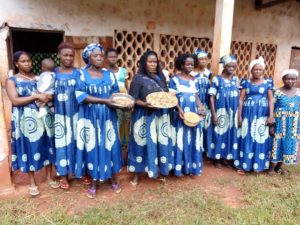
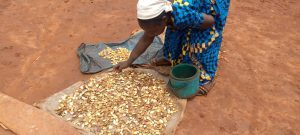
The NGO, AAFEBEN working closely with the local communities has actually done a lot to accompany them in the process.
A Memorandum of Understanding (MoU), was signed between the government represented by the Ministry of Forestry and Wildlife, and ASBABUK, a Baka association, in February 2019.
“I thank ASBABUK for coming to our aide,” the chief said insisting that “what we need now is more MoUs with forest companies that can actually give us way into the forest without suffering from torture of any nature”.
Following the Memorandum of Understanding, indigenous Baka communities had agreed on the modalities to harvest non-timber forest products (NTFPs) and carry out hunting and fishing in protected areas in south-east Cameroon.
The communities are found in 23 villages around Lobéké and Nki National Parks (NP). It was agreed that only Baka families would have access into the protected areas following a seasonal calendar of their activities and predetermined areas in the forest. All activities to be carried out in the interior of the national parks will follow Baka traditional lifestyle practices which are known to have little impact on the forest and its wildlife.
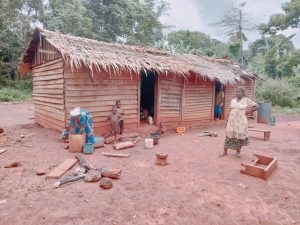
The indigenous peoples’ activities are split into three main areas; harvesting and gathering of non-timber forest products, subsistence hunting and fishing.
Simultaneously, another essential agreed aspect in the MoU is that the Baka will also refrain from felling trees for honey, illegal practices such as elephant poaching, metal cable snare usage and a sanction log.
The MoU signed with ASBABUK expired long ago and a new one is presently under review thanks to inputs from Green Development Advocate and AAFEBEN.
“We expect the government to review the limits of certain protected forest areas in the country as well as forest exploitation periods,” says Mr. Languel Simon Pierre, Chief of Center, AAFEBEN Boumba And Ngoko.
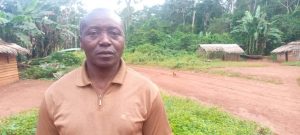
To him the present limits have limits.
Green Development Advocate (GDA) and AAFEBEN have resolved to continue the lobby so that local communities around forest zones can freely collect and benefit from Non Timber Forest Products (NTFPs).
This will greatly improve upon the wellbeing of inhabitants in such communities as well as promote development within the local communities.
The communities presently are still lagging behind in terms of development as a result of the situation.
“I will like to have a school in my village for my people to attend, I will like that they all have their birth certificates and national Identity Cards,” Chief Lessa Blaise pleaded with the powers that be.

